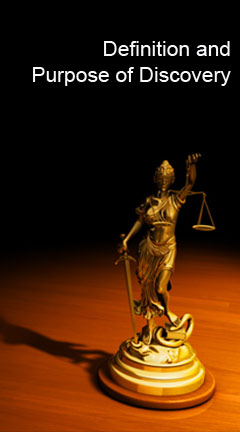Archival Notice
This is an archive page that is no longer being updated. It may contain outdated information and links may no longer function as originally intended.
Home | Glossary | Resources | Help | Course Map
Discovery has been defined as "the pre-trial devices that can be used by one party to obtain facts and information about the case from the other party in order to assist the party's preparation for trial."
Discovery is the pretrial process and ongoing obligation of the attorney that provides for the disclosure of information to the other party regarding the litigation. In general, the rules of discovery provide that the accused is entitled to any information related to the evidence in the case or information that may reasonably lead to discoverable evidence.
In layman's terms, discovery is the sometimes laborious process undertaken to learn the underlying facts surrounding a matter in dispute. Certain devices are available by rules of procedure or practice in various jurisdictions to help uncover the underlying facts.
Discovery includes any known information that will assist in preparing the defense and in preparing for the cross-examination or impeachment of an adverse witness. The rules of discovery also obligate the accused to disclose certain information to the government. Discovery is not unlimited; privileged information or trial strategy is not normally subject to disclosure.
Additional Online Courses
- What Every First Responding Officer Should Know About DNA Evidence
- Collecting DNA Evidence at Property Crime Scenes
- DNA – A Prosecutor’s Practice Notebook
- Crime Scene and DNA Basics
- Laboratory Safety Programs
- DNA Amplification
- Population Genetics and Statistics
- Non-STR DNA Markers: SNPs, Y-STRs, LCN and mtDNA
- Firearms Examiner Training
- Forensic DNA Education for Law Enforcement Decisionmakers
- What Every Investigator and Evidence Technician Should Know About DNA Evidence
- Principles of Forensic DNA for Officers of the Court
- Law 101: Legal Guide for the Forensic Expert
- Laboratory Orientation and Testing of Body Fluids and Tissues
- DNA Extraction and Quantitation
- STR Data Analysis and Interpretation
- Communication Skills, Report Writing, and Courtroom Testimony
- Español for Law Enforcement
- Amplified DNA Product Separation for Forensic Analysts


